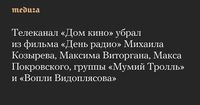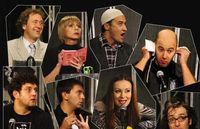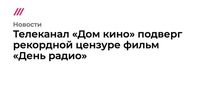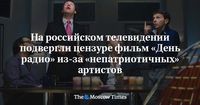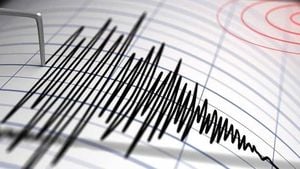The popular film "Day of Radio" has recently come under scrutiny for extensive censorship on the Dom Kino Premium TV channel. Viewers noticed significant edits, including the removal of musical performances by prominent artists such as Maxim Pokrovsky from the band Nogu Svelo, Ilya Lagutenko of Mumiy Troll, and members of the Ukrainian rock group Vopli Vidoplyasova. This alteration was highlighted by the Telegram channel Mozhem Obyasnit, which pointed out that these changes have sparked conversations about the impact of censorship in Russia.
In addition to the cuts of these performances, the initial credits of the film saw the names of journalist Mikhail Kozyrev and actor Maxim Vitorgan blurred out. Both Kozyrev and Vitorgan have been declared "foreign agents" by the Russian government, a designation that has increasingly affected artists and public figures who have voiced opposition to the state’s policies.
Despite their characters remaining in the film, the presence of Kozyrev and Vitorgan was significantly minimized. This raises questions about the extent of censorship in Russian media, particularly regarding films that feature critics of the government. The situation is not unique to "Day of Radio"; it reflects a broader trend where Russian TV channels and online platforms have repeatedly censored content that includes or mentions individuals critical of the authorities.
For instance, the Dom Kino channel previously blurred the posters of the DDT band in the film "Brother 2" and removed images of Alla Pugacheva from the movie "The Icebreaker." These actions indicate a systematic approach to controlling narratives that diverge from the official state line.
Mikhail Kozyrev, who played a central role in "Day of Radio," expressed his views on the futility of censorship efforts, stating, "We know for sure from history that not a single one of these censors will remain in it. We cannot fulfill the names of those people who demanded to ban, demanded to expel, destroyed circulations, expelled from the country." His comments reflect a historical perspective on censorship, suggesting that such measures are ultimately ineffective.
Commentators have attempted to dissect the logic behind these censorship decisions. Valery Lukashevich noted that while it would have been easier to ban the film outright due to its association with "enemies," the film's quality made such a ban difficult to justify. He remarked, "There is a strong dissonance: it was necessary to simply ban the film with enemies, but the film is too luxurious. On the other hand, there are too many enemies in it, and it’s a shame to ban it entirely because only enemies can make such a good and commercially successful film."
Moreover, the implications of this censorship extend beyond just the film industry. Political analysts, like S. Belkovsky, predict that censorship in Russia will evolve in a manner reminiscent of classic totalitarian regimes. He warned, "Soon unwanted heroes will begin to disappear from paintings and drawings. Then they will reach the classics, re-shoot Tarkovsky and Ryazanov, Kozintsev and Eisenstein, and rewrite Chekhov, Tolstoy, and Dostoevsky. The list of recognized/respected professions will include 'rewriters' and 're-directors.'"
In the context of these developments, the Russian government has intensified its campaign against what it deems "destructive content." On April 4, 2025, Alexander Bastrykin, head of the Investigative Committee of the Russian Federation, called for increased efforts to combat such content not only on the internet but also in cinema, music, print media, and computer games. He emphasized the need to monitor messaging platforms, claiming they are used to draw minors into criminal activities.
The censorship of "Day of Radio" and similar films illustrates a growing trend of state control over cultural outputs in Russia. As artists like Maxim Pokrovsky and Mikhail Kozyrev continue to face repercussions for their outspoken views, the landscape of Russian cinema and media is becoming increasingly fraught with challenges. This situation raises critical questions about artistic freedom and the role of censorship in shaping public discourse.
As these events unfold, the public's reaction to such censorship will be crucial in determining the future of artistic expression in Russia. The voices of artists and critics will continue to be vital in challenging the narratives imposed by the state, even as they face increasing scrutiny and censorship.

